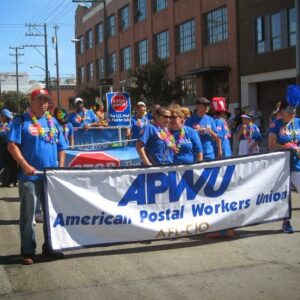January 28, 2011
With Slow Progress, Contract Talks Continue
Union Asks for Members’ Continued Support
“Although progress in contract negotiations is slow, bargaining is ongoing,” APWU President Cliff Guffey reported on Jan. 28. Representatives of the Postal Service and the union are meeting almost daily, he added.
“I know that many of our members are eager to hear details about our exchanges,” Guffey said. “Unfortunately, while talks are ongoing, it is not feasible to elaborate on specifics. Unless and until we reach agreement on all of the outstanding issues, the concepts the parties have been considering are just that — concepts. They will only have meaning if we reach agreement on a complete contract.
“The APWU negotiating team is determined to work for a contract that benefits union members and that will enhance the long-term viability of the Postal Service,” he said. “I ask members for their continued support as the process goes on,” he noted.
The union has outlined its goals many times, he said. “We are seeking to preserve jobs and reduce the pain of excessing for our members,” he said. In December, the APWU and the Postal Service agreed to a moratorium on excessing, which applies to excessing outside of a craft or installation. The moratorium will remain in effect as long as bargaining continues.
One of the union’s top priorities is to regain duties that have been contracted out or given to supervisory personnel.
“The proposals we have submitted to achieve these objectives also would benefit the Postal Service,” Guffey said. “They would reduce USPS costs, because our members can perform the work more efficiently and at a lower cost.”
In addition to job security and excessing, the parties are discussing wages, benefits, and issues related to workforce structure.
The Process
The contract was originally scheduled to expire Nov. 20, but the union and management agreed to extend bargaining. The 2006-2010 Collective Bargaining Agreement will remain in effect until a new agreement is reached through negotiation, mediation, or arbitration.
Under the terms of the Postal Reorganization Act of 1970, when the union and management fail to reach agreement on a successor contract and do not agree on an alternate procedure, the Federal Mediation and Conciliation Service (FMCS) appoints a mediator. If a settlement is not reached within 60 days of the expiration of the contract, both parties submit all outstanding issues to binding arbitration.
The extension of bargaining qualifies as an “alternate procedure,” so the FMCS has not appointed a mediator and the 60-day period for submitting issues to arbitration has not begun, Guffey explained.
If arbitration becomes necessary, the APWU will appoint an arbitrator, as will the USPS. The two party-appointed arbitrators will work with a neutral arbitrator to ensure that each side’s interests are clearly understood.
For the latest developments on contract negotiations, please visit www.apwu.org. Members are also encouraged to follow the union on Twitter and Facebook to receive up-to-the-minute alerts by e-mail or text message.


